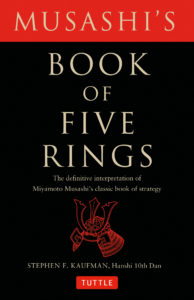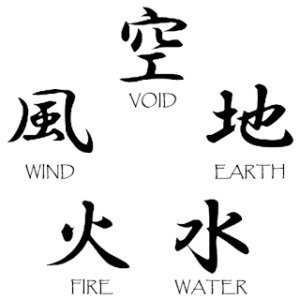
The book of the month is…
The Book of Five Rings, the classic guide to strategy written over three centuries ago by a Samurai warrior, the book has been hailed as a limitless source of psychological insight for businessmen or anyone who relies on strategy and tactics for outwitting the competition.
It enjoys an audience considerably broader than only that of martial artists: for instance, some business leaders find its discussion of conflict and taking the advantage to be relevant to their work. It as a manual of technique and philosophy.
Musashi establishes a “no-nonsense” theme throughout the text and he also continually makes the point that the understandings expressed in the book are important for combat on any scale, whether a one-on-one duel or a massive battle. Descriptions of principles are often followed by admonitions to “investigate this thoroughly” through practice rather than trying to learn them by merely reading.
Although it is difficult to grasp it from the book, these books are actually the teachings which Musashi preached to his students in his own dojo. Though ideas are taken from other sources, the text is predominantly seminal.

The five “books” refer to the idea that there are different elements of battle, just as there are different physical elements in life, so the five books below are Musashi’s descriptions of the exact methods or techniques which are described by such elements:
- The Book of Earth chapter serves as an introduction, and metaphorically discusses martial arts, leadership, and training as building a house;
- The Book of Water chapter describes Musashi’s style, Ni-ten ichi-ryu, or “Two Heavens, One Style”. It describes some basic technique and fundamental principles;
- The Book of Fire chapter refers to the heat of battle, and discusses matters such as different types of timing;
- The Book of Wind chapter is something of a pun, since the Japanese character can mean both “wind” and “style” (e.g., of martial arts). It discusses what Musashi considers to be the failings of various contemporary schools of sword fighting;
- The Book of the Void chapter is a short epilogue, describing, in more esoteric terms, Musashi’s probably Zen-influenced thoughts on consciousness and the correct mindset.
Inside the five books he explains his nine principles seemd to apply to life in general and leaders:
- Do not think dishonestly
- The Way is in training
- Become acquainted with every art
- Know the Ways of all professions
- Distinguish between gain and loss in worldly matters
- Develop intuitive judgment and understanding of everything
- Perceive those things which cannot be seen
- Pay attention even to trifles
- Do nothing which is of no use
As a set of core principles, these are not a bad way to lead one’s life.
The Book of Five Rings: An interesting book that claims to help in your finding what is the truth for you. A book to think about and approach with consideration and hopefully wisdom.
